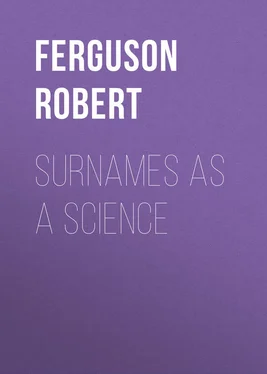Robert Ferguson - Surnames as a Science
Здесь есть возможность читать онлайн «Robert Ferguson - Surnames as a Science» — ознакомительный отрывок электронной книги совершенно бесплатно, а после прочтения отрывка купить полную версию. В некоторых случаях можно слушать аудио, скачать через торрент в формате fb2 и присутствует краткое содержание. Жанр: foreign_antique, foreign_prose, на английском языке. Описание произведения, (предисловие) а так же отзывы посетителей доступны на портале библиотеки ЛибКат.
- Название:Surnames as a Science
- Автор:
- Жанр:
- Год:неизвестен
- ISBN:нет данных
- Рейтинг книги:3 / 5. Голосов: 1
-
Избранное:Добавить в избранное
- Отзывы:
-
Ваша оценка:
- 60
- 1
- 2
- 3
- 4
- 5
Surnames as a Science: краткое содержание, описание и аннотация
Предлагаем к чтению аннотацию, описание, краткое содержание или предисловие (зависит от того, что написал сам автор книги «Surnames as a Science»). Если вы не нашли необходимую информацию о книге — напишите в комментариях, мы постараемся отыскать её.
Surnames as a Science — читать онлайн ознакомительный отрывок
Ниже представлен текст книги, разбитый по страницам. Система сохранения места последней прочитанной страницы, позволяет с удобством читать онлайн бесплатно книгу «Surnames as a Science», без необходимости каждый раз заново искать на чём Вы остановились. Поставьте закладку, и сможете в любой момент перейти на страницу, на которой закончили чтение.
Интервал:
Закладка:
The name Sigimar, of the brother of Arminius, I have already shown that we have, not only in its own form as Seymore , but also in its High German form as Sycamore , the Anglo-Saxon names from which they may be taken to be more immediately derived being also found in the chapter on place-names. And I have also shown that we have the name Cariovalda (or Harwald) of a prince of the Batavi, of the first century, in our Harold .
There was another old hero of the German race, not so fortunate as Arminius in finding an historian in a generous foe, whose name only comes before us in a line of Horace: —
Cotiso must have been a leader of some High German tribe, perhaps somewhere on the Upper Danube, and he must have made a gallant stand against the Roman arms, inasmuch as his final overthrow is deemed by the Roman poet a worthy subject on which to congratulate his imperial patron. Cotiso is a High German form of another name, Godiso or Godizo, elsewhere referred to, and hence may be represented, I venture to think, in our names Godsoe and Goddiss , while Cotiso itself may be represented in our Cottiss , the ancient vowel-ending being in our names, as I shall show in the next chapter, sometimes dropped and sometimes retained.
Another name which goes back to the first century of our era is Arpus, that of a prince of the Catti in Tacitus. The Eorpingas, descendants or followers of Eorpa, were among the original settlers, and seem to have confined themselves to Norfolk, where alone we have any traces of them. The name may perhaps be referred to Anglo-Saxon eorp , wolf, though other derivations have also been proposed. We have the name at present as Earp (the name of a member of the House of Commons), and also as Harp . Upon this stem is formed the name Arbogastes ( gast , guest) of a Frankish general under the Emperor Gratian in the fourth century; and Arbogast is still a family name among the French.
Lastly, let us take the name of the German king, Ariovistus, brought before us by Cæsar. The proper form of this name, there seems little doubt, is Arefastus, as found in some other O.G. names. There was also an Arfast, bishop of East Anglia, in the time of William the Conqueror. And Arfast is a present name among the Frisians, according to Outzen, who compares it – rightly, as it seems to me – with the old name Ariovistus. The corresponding name Arinfast ( aro , arin , eagle) was also in ancient use among the Danes. It seems to me that our name Harvest may easily be a corruption of Arfast; it has generally no doubt been derived from a man's having been born at such a season, but I distrust, as a general rule, as elsewhere stated, derivations of this kind.
In connection with the subject of the antiquity of Teutonic names generally, and of English names as derived from them, I shall have, in a subsequent chapter, to refer to the names of original settlers in England as deduced by Kemble from ancient charters, and compare them with names of a similar kind found in Germany. The coincidence that will be found in these names at that early period, from England and Friesland in the north to Bavaria in the south, will, I think, be a very strong argument to show that these names could not have originated within the Teutonic area itself, and so dispersed themselves over it in its length and breadth, but that they must have been brought with them by the Teutonic invaders from their earlier homes.
CHAPTER II.
CLUE TO SOME OF THE ANCIENT FORMS REPRESENTED IN ENGLISH NAMES
So long as our surnames are treated as if each name were something standing apart by itself, very little progress can be made in their elucidation; it is by collation and comparison that, in this as in any other science, definite results are to be obtained. And a moderate amount of attention to the forms in which these names appear, and to the various endings prevalent among them, will enable many names, otherwise unrecognisable, to be brought within the pale of classification and of possible explanation. I am of course referring to that portion of our surnames – a much larger one according to my judgment than is generally acknowledged – which dates back to Anglo-Saxon times, and so forms a part of the general system by which Teutonic names are governed.
I shall have, in the course of this work, frequently to refer to the Teutonic system, and to names which do, or do not, according to my judgment, enter into it. And I will therefore, before going further, endeavour to explain what I mean by the Teutonic system. There is, then, a class of words which, at a time of remote antiquity, have been adopted as stems upon which, in some cases by a sort of phonetic accretion, in some cases by the addition of a diminutive ending, in some cases by forming a patronymic, in some cases by taking in another word as a compound, a number of other names have been formed. Thus, when we find such a group of names as Dill , Dilly , Dillow , Dillen , Dilling , Dilke , Dilwyn , or as Budd , Budden , Buddle , Budding , Buddrich , Budmore , we may take it that these are all ancient names, of which Dill and Budd are respectively the stems. And whenever we find a group of names with endings such as it is my object in the present chapter to explain, and in compounds such as will be dealt with in a succeeding chapter, we shall be warranted in assuming the antiquity of the group.
And in the first place, let us take the endings in a , i , and o , of which the above are nothing more than arbitrary variations of spelling. Now ancient Teutonic names formed of one single word had commonly, though not invariably (and the same thing applies also to ancient Celtic names), a vowel-ending in a , i , or o ; this ending is in our names sometimes dropped and at other times retained. (It is to be observed, however, that even in Anglo-Saxon times it is not an unfrequent thing to find the same name variously with and without a vowel-ending, of which some instances may be noted in Chapter V.) Thus we have Abbe , Abba , and Abbey , we have Bell , Belly , and Bellow , we have Earl and Early , we have Dand , Dandy , and Dando , we have Brand and Brandy , we have Todd and Toddy , we have Dane and Dana , we have Marr , Marry , and Marrow . These are all ancient names, variously with and without the vowel-ending, and it will be readily seen how apt the addition is to disguise the name, and to give it the appearance of something else.
The question now to consider is – What is the value and meaning of this vowel-ending, which was only given to simple names and never to compounds? It might be, in some cases, used simply as a sort of euphonic rounding-off of a name which might seem meagre and insignificant without something of the sort. We ourselves appear to use s in the same manner in the case of some very short names, such as Wills and Epps, in which the final s may perform the same service that was rendered by the vowel-ending. But there is also another principle which I think obtains, and which, indeed, may be the guiding principle in such cases. In Anglo-Saxon (and the same principle applied to other Teutonic dialects), the addition of a to a word implied connection with it. Thus, from scip , a ship, is formed scipa , one connected with a ship, a sailor. Now, going back to the remote origin of names, there were many cases in which a man took a name from an abstraction, such as war, peace, glory, victory, or from a weapon, as the sword or the spear, and it is obvious that in such cases he required something to connect his name with it, and this is, as it seems to me, what was effected by the ending in question. And the principle is still a living one among us, and we form names daily in accordance with it, though we no longer use the ending in a , which has been superseded by that in i . 8 8 How or when this change took place is a question that awaits solving, but I observe that, in 1265, the Countess of Montford, giving names (or sobriquets) to her servants, calls one of her messengers Treubodi (trusty messenger), and not Treuboda, as the Anglo-Saxon form would have been.
A connection with anything whatever is expressed by this ending, as when a stupid person is called "Duncey," one with a remarkable nose "Nosey," or one with a halting gait "Stumpy." The French seem to have retained their old ending, and, when they form names of this sort, to do it with the ending in o ( eau ) which appears to be in accordance with the genius of their language, as that in i ( ey ) is with that of ours.
Интервал:
Закладка:
Похожие книги на «Surnames as a Science»
Представляем Вашему вниманию похожие книги на «Surnames as a Science» списком для выбора. Мы отобрали схожую по названию и смыслу литературу в надежде предоставить читателям больше вариантов отыскать новые, интересные, ещё непрочитанные произведения.
Обсуждение, отзывы о книге «Surnames as a Science» и просто собственные мнения читателей. Оставьте ваши комментарии, напишите, что Вы думаете о произведении, его смысле или главных героях. Укажите что конкретно понравилось, а что нет, и почему Вы так считаете.












